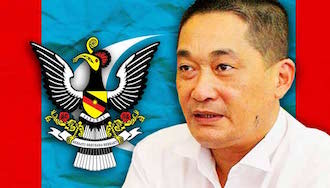PKR: Under Constitution S’wak is a state, not a region
SUPP President Dr Sim Kui Hian’s suggestion is politically sexy and certain to provoke excitement, but it is perilous at worst, says PKR’s See Chee How.
(FMT) – Calling Sawarak a region instead of a state will not contribute towards the evolution of a meaningful Sarawakian nationalism, said state PKR Vice-Chairman See Chee How.
In a press statement published on Borneo Post Online, See said Sarawak, as stated in the Federal Constitution, was part of the 13 states in the Federation of Malaysia.
“Sarawak was referred to as a ‘state’ not after the formation of Malaysia. It was referred to as such in the Malaysia Agreement concluded and signed on July 9, 1963.”
See, who is also Batu Lintang assemblyman, was commenting on SUPP President Dr Sim Kui Hian’s statement last weekend, where the latter had urged Sarawak Chief Minister Adenan Satem to refer to Sarawak as a region instead of a state when negotiating for the devolution of power and autonomy with the Federal Government.
See explained that Article 1 of the Malaysia Agreement provides that the States of Sarawak, Sabah and the State of Singapore (irrelevant now) shall be federated with the existing States of the Federation of Malaya and the Federation shall thereafter be called “Malaysia”.
“It is shocking to know that the state minister (Dr Sim) does not have this basic knowledge about the history on the formation of Malaysia and how the word ‘state’ is being used and provided under Federal Constitution,” he added, arguing that there was no basis for Sarawak to be referred to as a region.
“The suggestion by the local government minister is politically sexy and is certain to provoke excitement, but it is perilous at worst.
“It is diverting efforts for the devolution of federal power and returning autonomous power to Sarawak towards unnecessary arguments of forms at best.”
He opined that the term “state” imposed on Sarawak “does not in any way derogate it”, especially in the construction and formulation of the provisions in the Malaysia Agreement.
He then said that if Dr Sim was serious in his suggestion, the latter as a Senator, or through an MP of his party, could move a motion or Bill in Parliament to push for necessary amendments.
“Sarawakians of all diversity, even with political differences, are united in the efforts to demand for devolution of federal power and the return of the deserved autonomous power to the state, within the ambit of the Federal Constitution.
“But the least we need now is unnecessary provocation that may elicit retaliation that will hurt the evolution of a nourishing and meaningful Sarawakian nationalism and hamper all efforts in the negotiations and demands for the devolution of federal power and returning of our deserved autonomous power to Sarawak.”
Assistant Minister of Housing Abdul Karim Hamzah, on the other hand, described Dr Sim’s suggestion as “very subjective”, and expressed support for Sarawak to continue being referred to as a state considering the fact that it was part of Malaysia.
“Sarawak can still be considered a state, but it is a state within a union … within a confederation.
“So, whether we should call ourselves just Sarawak or a state, to me that is minor,” he said, as was quoted by the English portal.
“What is more important here is when we signed the (Malaysia) Agreement, there were certain rights that we agreed upon, and these are the rights that have diminished for the last 53 years. We are trying to get them back.”
He also said the matter was sensitive and public focus should instead be directed towards Sarawak’s rights which he hoped would be returned to the state eventually.
“Unlike the Federated and Unfederated Malay states of Peninsular Malaysia that came in as signatory to the Malaysia Agreement 1963 as one entity, we (Sarawak) came in as another entity, Sabah came in as another, and Singapore, too.
“The way I see it, strictly from a legal aspect, it should be called a federation of states.
“Hopefully, with Adenan’s high spirit in wanting to ensure that these rights are returned, we will be able to get it back, probably by the end of this year or next year.”


